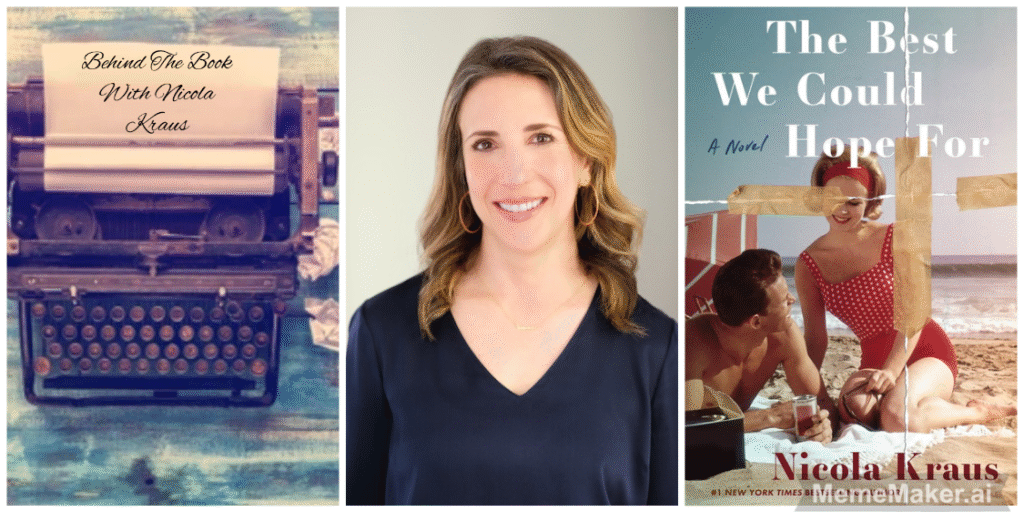Newsletters
Behind The Book With Nicola Kraus
New Information about Upcoming Book Related News
Behind The Book With Nicola Kraus
Nicola Kraus who is the New York Times Bestselling author of The Nanny Diaries along with co-author Emma McLaughlin is now back to discuss her first solo novel The Best We Could Hope For coming out on May 1st! I am so excited about doing this Behind The Book Q&A with her discussing the novel!
Q: For those who haven’t read The Best We Could Hope For, would you like to give a brief description of the novel?
A: The novel opens in 1943 and follows the lives of two sisters, Jayne and Bunny, over the course of the 20th century. In the late 60s, Bunny, who ran away from home as a teenager, abandoned her three children with Jayne. As months turn into years without words, Jayne and her husband, Rodger, a rising journalism star, strive to give the children the opportunity to flourish, even as they have two more of their own. But then, after nearly a decade, Bunny resurfaces and sets a chain of events in motion that detonates all their lives.
As adults, their children try to reassemble the pieces and solve the mystery that has always haunted them. Who were their parents? What really happened between them? And who is ultimately to blame for the destruction? But will the answers they seek set them free—or lead to something far more damaging than anyone imagined?
Q: In our regular Q&A you wrote that The Best We Could Hope For is the first book you wrote solo without Emma McLaughlin. Was it an easy transition going from writing with someone else to writing solo?
A: While it was lonely at times, it was also tremendously liberating to be able to heed my own creative impulses without having to explain or negotiate them. That place of silence is a fertile place for me; it’s just me listening to the characters and I love being able to stay there for months at a time.
Q: There are darker themes of abuse mentioned in the book. You normally write more lighthearted stories. Was the transition from writing lighthearted books to The Best We Could Hope For difficult? Was this another reason why it took you 8 years to write the book?
A: Funnily, no. As the saying goes, comedy equals tragedy plus time. All our books had dark themes running through them. We just used the function of time to find humor. Our first novel was about child neglect, and the exploitation of an undocumented workforce. We just found a way to make it satirical. This novel is told in the present. The humor has not arrived yet ☺
Moreover, as a reader and a thinker, I have always been preoccupied with the legacy of abuse. Whether it was reading authors like Jeanette Winterson in college, or novels like The Lovely Bones or The End of Alice, the fact is a third of women experience some form of abuse in their lifetimes. One of the great legacies of the #metoo movement is finally talking about how prevalent this is. What I am interested in is how we move forward, how do we find healing, how do we learn to trust and love again? How do we find joy?
Q: You wrote in our regular Q&A discussing the novel about what lessons you hope readers learn after reading The Best We Could Hope For, Love is all that matters, which seems obvious and yet too often we lose sight of that in our consumer-driven society. And I believe that love transcends death. The damage we sustain and visit on others’ lives in this silly flesh suit we carry around. When we die and leave the physical and emotional pain behind, love can surface and flourish–if we tune into it. What emotions do you hope readers feel after they read the book?
A: So far, I am hearing that the book is leaving readers wrung out in the best way. (I love it when they send pictures of themselves ugly crying.) But also, a word that is coming up a lot in reviews is “healing.” Hopefully this book feels like getting a good hug after a great cry.
Q: What would some of the characters be doing right now if you wrote a sequel?
A: Clyde has amassed a giant social media following and I hope he’s using it for good. Huck is finally finishing his engineering degree. Sage moved to Massachusetts in the pandemic and loved it. And Lin is still teaching art and raising her daughter, who brings her so much joy.
Q: If/when Hollywood gets the rights to The Best We Could Hope For, do you have a dream cast in mind to play the characters you created?
A: Disregarding the space/time continuum, I picture Lin as Anne Hathaway in Rachel Getting Married. Jayne is Nicole Kidman and Rodger is Mark Duplass.

